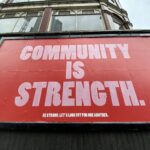As Black History Month comes to an end, and hopefully we plan to continue learning and acting for racial justice, this week’s post reflects on the many possible ways to take action for racial justice. Reading and knowledge are suggested, yet not enough.
In Twelve Step rooms, we are told often that willingness to change is the key to recovery. A friend once said it more succinctly to me: “Tom, willingness to change without action is fantasy.” Racial justice is everyone’s responsibility. Wishing for change without action is fantasy.
I am not suggesting we have to take action in any particular way. What I am advocating is that we each have a responsibility to ask ourselves what is mine to do to work for “liberty and justice for all.” Like other important changes we commit to, this means being open to not knowing and discomfort, and even some “mistakes.” To help you and me consider some individual and collective actions, I am offering some possibilities. I am inviting readers to add others in comments on this post (below).
Ironically one place to start is to commit to more learning. One powerful way to do that is to attend a structured learning group. Reading or watching a video by myself is not the same as being with a group. Some groups are white people learning together, and others are racially and ethnically diverse. As you explore groups, you will see that whites learn about white oppression by themselves so as to not cause more harm to people of color during their learning.
In the Baltimore-Washington region, there are a range of both local and national groups. If you are part of an organized church, synagogue or mosque, there are likely ongoing groups you can join. In Baltimore, an informal group of Catholics has come together to offer a six-week introduction to anti-racism. Initially called Honest Conversations about Racism, over two dozen communities in the Baltimore-Washington area have now participated. An action step from these groups is a monthly gathering on different busy street intersections in Baltimore with people carrying signs that say Black Lives Matter. When it was realized that people in this monthly group were Christians, Jews, and Muslims, the name of the group was changed to The Black Lives Matter Interfaith Coalition. The group still meets on the third Sunday of the month on a different well-trafficked street corner for one hour. There is conversation, shared prayer, and planning for the next month’s gathering.

Some other examples of groups taking action for racial justice include:
- The Sandy Spring Friends Meeting and its series Beyond Acknowledgement: Committing to Antiracist Work through Transformation and Reparative Actions.
- Jews United for Justice (JUFJ) and their campaigns that advance economic, racial and social justice throughout the Baltimore- Washington region.
- National groups active in the Baltimore-Washington area and other communities across the country:
- Stand Up for Racial Justice (SURJ) is “a national network of groups and individuals organizing white people for racial justice. Check out its website for a chapter near you and for ongoing opportunities to become involved for racial justice. Guest Editor Dave Cramer described in his post his work with SURJ to influence the police review process in Baltimore. Coming to the Table (CTTT) has six groups operating in MD and is active in sixteen states. Its mission is to provide leadership, resources, and a supportive environment for all who wish to acknowledge and heal wounds from racism that is rooted in the United States’ history of slavery.” Most chapters offer monthly discussion meetings and involvement in events and actions that advance racial justice.
- Black Lives Matter continues to organize and work “..to heal the past, re-imagine the present, and invest in the future of Black lives through policy change, investment in our communities, and a commitment to arts and culture.”
These are just a sample of the many opportunities to be part of the movement for more racial justice. If you’d like a place to start or take some new actions, consider joining me at our 90-minute Racial Justice Conversation on the first Wednesday of the month at 5 p.m. Eastern on zoom. Each meeting offers a learning opportunity, sharing on actions upcoming or completed, and ways we are noticing how being white influences our views and opportunities. (Email me for the zoom link)
Or as discussed in last week’s post, consider gathering with a few friends to discuss Tamara Copeland’s book of weekly readings on racial justice Revealed and see what actions might emerge.
The Standing Up for Racial Justice website sums up the call to action in a way I think we can all understand: “When we fight racism, we all win.”




tom,,
I am going to look into Revealed for my own growth and perhaps for a group discussion. Tuck
Thanks Tuck, I appreciate the many ways you continue to explore racial justice and actions you can take to advance justuce.